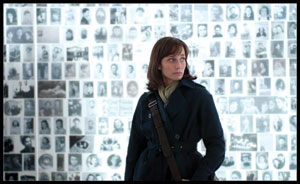Consider the needs of those all around us
“Thank you Kansas City and the Jewish Federations of North America for your incredible generosity: You help people in need, everywhere, everyday!”
Those were the words I heard several times while traveling on a Jewish Federation mission this summer to Moscow and Israel. And I want to echo the sentiment by thanking everyone, particularly the board of directors of the Jewish Federation of Greater Kansas City, for sending me.
I went on the mission to better understand the programs we fund, and to meet the people we help. What impressed me was the professionalism of the staff, breadth of the projects and gratitude of the recipients. Through our generosity, the gifts we give to the Jewish Federation provide a lifeline to those in need. Not only are we helping people, we are changing lives.
What follows are some specific examples of our generosity as seen in Moscow and Israel:
In Moscow, 165,000 seniors rely on a network of chesed programs for food, medicine, health care and physical and intellectual stimulation. At the Chesed Chama Senior Center, we saw art and music activities, and helped assemble and deliver food bags for homebound seniors. I took a bag to 94-year-old Raisa, who is confined to her sixth floor, one-room apartment. Raisa greeted us warmly and with appreciation. She regrets not going to Israel 20 years earlier. Now she is alone, visited occasionally by a distant relative. Thanks to our generosity, Raisa — and thousands of others — live in dignity with their health and nutrition needs met.
Moscow teens enjoy hanging out with friends. They gather at their newly remodeled Jewish Club in downtown Moscow for classes or to socialize. For some, this is their only connection to Judaism. Other teens attend a 10-day summer camp, such as the one we visited two hours outside Moscow. Together with the teens, we did interactive, hands-on activities involving Bible verses — we had as much fun as they did! Who would have guessed I would be speaking Hebrew in a Russian forest with Liza, a 16-year-old blonde beauty who attends high school in Israel on the Na’aleh Program. After graduation, she will join the IDF and make aliyah ahead of her family. The smiles on the faces of these grateful teens said it all.
Similarly, teens in our sister city, Ramla, Israel, are all smiles over the Net@ program, a computer-based after-school youth movement that is changing the lives of at-risk youths in smaller cities around Israel. Galit, a Net@ participant, originally hated computers. Now she is a leader and spokesperson for the program. In order to understand the impact Net@ has had on her life, Galit insisted on taking us to meet her grandparents at their house and synagogue. We joined Galit and her Ramla Net@ participants (including Israeli Arabs and Christians) on a scavenger hunt through their local market before going to the Net@ building. According to the Net@ founder, the IDF has noticed the youths’ exceptional computer skills and has placed them in very prestigious units. This transformative program is changing the lives of teens and having a positive impact on their futures.
In Ashdod, ultra-religious Jews’ lives are being changed by the Mafteach program that provides job training and counseling and is the literal key to breaking the cycle of poverty for these families. Religious women find jobs that accommodate their religious and family needs. Religious men are encouraged to enter special IDF units that help provide education and job training. The program has the support of local and national rabbinic leaders. The recipients we met were very grateful.
Often recipients do not realize who is helping them. For example, our group leader explained to 30 Russians making aliyah on our El Al flight that the state of Israel — together with the Jewish Federations of North America — fund their move and integration into Israeli life. Shlomo Moula, a Knesset member, expressed his gratitude to us on behalf of the Ethopian community for the ongoing support that brought him to Israel 30 years ago. Finally, we attended an amazing concert in Tel Aviv, along with 3,000 Taglit-Birthright participants. Most participants only view the experience as a “free trip” — they do not realize that the trip is funded jointly by local federations and the state of Israel. And yet, the appreciation of recipients is palpable. Just look at the smiles.
I returned with a renewed sense of purpose: To continue raising awareness and funds to meet current and future needs locally and around the world. The gratitude I felt was icing on the cake. I will forever remember Raisa, Liza, Galit and the many grateful people I met on the trip.
The upcoming Jewish New Year is a good time to reflect on our lives and consider the needs of those around us. Thanks to your generosity, the Jewish Federation is helping people everywhere, everyday … as far away as Moscow and Israel, and right here in Kansas City.



 “The Debt” is a spine-tingling espionage thriller that holds the audience spellbound with all its twists and turns. It is directed by Academy Award nominee John Madden (“Shakespeare in Love”) and based on the 2007 Israeli film “Ha-Hov.” The movie opened yesterday (Wednesday, Aug. 31) in wide release.
“The Debt” is a spine-tingling espionage thriller that holds the audience spellbound with all its twists and turns. It is directed by Academy Award nominee John Madden (“Shakespeare in Love”) and based on the 2007 Israeli film “Ha-Hov.” The movie opened yesterday (Wednesday, Aug. 31) in wide release. “Sarah’s Key” is a war drama based on the beloved best-selling 2007 novel by Tatiana de Rosnay. The characters are entirely fictitious, but they put names and faces to the 13,000 Jews arrested by the French police in the great Velodrome d’ Hiver roundup that took place on July 16, 1942, in the heart of Paris. The book and movie adaptation tell a story that should never be forgotten. It is a tribute to the 76,000 Jews deported from France during the Holocaust with special mention to the children who never came back and the few lucky ones that survived. The movie opens tomorrow (Friday, Aug. 19) exclusively for a limited engagement at the Glenwood Arts and AMC Town Center 20.
“Sarah’s Key” is a war drama based on the beloved best-selling 2007 novel by Tatiana de Rosnay. The characters are entirely fictitious, but they put names and faces to the 13,000 Jews arrested by the French police in the great Velodrome d’ Hiver roundup that took place on July 16, 1942, in the heart of Paris. The book and movie adaptation tell a story that should never be forgotten. It is a tribute to the 76,000 Jews deported from France during the Holocaust with special mention to the children who never came back and the few lucky ones that survived. The movie opens tomorrow (Friday, Aug. 19) exclusively for a limited engagement at the Glenwood Arts and AMC Town Center 20.